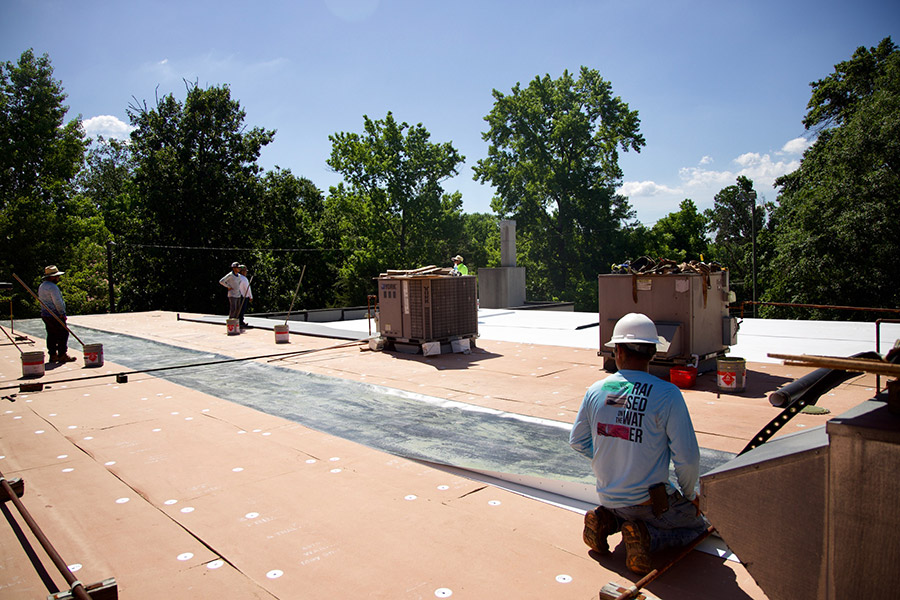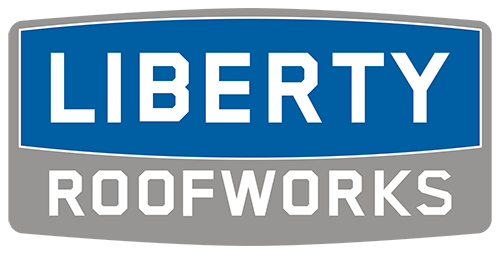One of the most crucial elements of a building’s exterior is its commercial roofing. It improves the structure’s looks, makes the ambience more friendly for onlookers, and safeguards the interior from dampness and outside dangers.
Commercial roofing may not initially appear to be as complicated as residential roofing. Regardless, you must take into account a number of key distinctions before deciding which kind of roofing system is best for your project.
We have put together this comprehensive guide to assist you in getting started. You will discover everything you need to know about a commercial roof replacement, including the numerous varieties that are available and the various uses commercial roofing professionals can add to them.

Commercial Roofing: What Is It?
Protecting your property is the main purpose of both residential and commercial roofing systems. The materials used in their construction and installation, however, are very different.
For commercial roof replacement systems, commercial roofing contractors frequently utilize single-ply (PVC, TPO, EPDM), built-up roofing systems, modified bitumen, concrete, tar and gravel, and other materials. Residential structures may have concrete tiles or asphalt shingles put on their roofs, depending on the environment.
Since there are more options for commercial roof repair systems than for residential roofs, you must do extensive research and choose a reliable commercial roofing company that offers a wide range of services to guarantee positive results.
Do You Need to Replace Your Commercial Roof?
What roof deterioration symptoms point to the need for a replacement?
- Water pools – If there are water puddles on your roof, the drainage system has probably failed.
- Flashing that has been damaged should be replaced since it hides roof seams. Water may therefore seep through the seams if it is weak and you are unaware of it earlier, necessitating a repair.
- After nearly 15 years of usage, these defects typically manifest as cracks and tears.
- Roof leaks – If you don’t immediately remedy leaks, they might cause serious issues like mildew or mold.
Water stains – Stains of water on the ceiling may indicate a leaking roof. - Rips in your roof’s membrane – PDM rubber roofs, the most common type of commercial roof, include protective rubber membranes. The waterproof barrier will become compromised, allowing moisture to enter the building.
- Unattached or loose EPDM membrane – If your roof’s membrane flaps in the wind, your structure is not being protected.
- Roof membrane bumps are often an indication of loose fasteners.
- If there is mold visible or odorous in your building, water may leak through the roof, endangering the health of the people.
Contact Us Today
1397 Cilantro Ct.,
Tega Cay SC 29708
Monday-Friday | 8am-5pm
(704) 463-8177
Types of Commercial Roofing Systems
We have included the many types of roof systems here for your convenience. Reviewing the following categories:
EPDM Roof Membrane or Thermoset
Commercial roofs, also known as EPDM roofing, are versatile, durable, and simple to maintain in comparison to other thermoset roofing. It features a simple installation process, is constructed of single-ply rubber components, and is ozone and UV light resistant.
The resistance to acids, alcohol, and solvents, flexibility at milder temperatures, and reflective qualities that can help lower cooling costs are other advantages of EPDM roofing.
Thermoplastic or TPO & PVC Roof Membrane
For second-generation installations, TPO (thermoplastic polyolefin) and PVC (polyvinyl chloride) roofs work best. They are thin, incredibly reflective, impervious to chemicals, UV light, piercings, and bacterial growth. Restaurants, hotels, and other establishments that employ ventilation systems that emit oils are suitable applications for TPO and PVC commercial roofs.
Green Roofing System
In recent years, green tops have emerged as a sustainable real estate option. They can resolve drainage and water problems while also boosting efficiency. They are also attractive and environmentally beneficial commercial roofing materials.
Built-up or Membrane Roofing (BUR)
The most popular gravel and tar roofing technique is known as built-up, or BUR roofing. It has many layers or heaps, which makes the system more resilient. If you’re looking for a long-lasting, budget-friendly choice, BUR is a wonderful roofing solution.
A metal roof
Metal roofs are a common style of business roof. There are a variety of materials available, including metal tile sheets, stainless steel, corrugated galvanized steel, silicon-coated steel, stone-coated steel, aluminum, copper, tin aggregates, and zinc.
Commercial metal roofs also have strong fire resistant benefits and a long lifespan. To prevent corrosion and fading caused by sunshine or other environmental factors, they usually include protective coatings. Additionally, they are a desirable choice that helps make your building’s construction more environmentally friendly.
Modified Bitumen Roofing
The roof’s structure is made up of layers of reinforced roof fabrics and bitumen. Mod-bit roofing refers to a commercial roofing repair system made of modified bitumen. It is two-ply attached to tops in order to provide the most solidity and security.
Commercial flat roofs lack the tensile strength of modified bitumen roofs, which also cost less to maintain. Furthermore, if you anticipate a lot of activity, it is perfect for commercial roof repair.
Typical Materials for Commercial Roofs
In the end, your structure’s function, preferences, and budget will determine the best roofing material to use. Each material has benefits and drawbacks.
An expert in commercial roofing can provide you advise, but ultimately, it’s up to you! What you need to understand about the various commercial roofing systems is as follows:
Asphalt
A base mat, a layer of impermeable asphalt, and a topcoat of ceramic granules make up asphalt. Added benefits of industrial asphalt roofing include:
- Attractive
- Cost-effective
- Durable for 15 to 30 years
- Climate resistant
- Multiple colors and styles
- Low maintenance
Metal
Steel is the most popular and cost-effective metal roofing material, with the others being copper, aluminum, zinc, tin, and steel. Additionally, the advantages of commercial metal roof systems include the following:
- Quick installation
- Environmentally friendly
- High return on investment
- Noncombustible
- Durable for 40 years
- Low maintenance
Standing Seam Metal Roofing
Systems for standing seam metal roofing have flat gaps between their trapezoidal or vertical legs and hidden fasteners.
Standing seam metal roofs are advantageous for commercial buildings in the following ways:
- Suitable for complicated, multi-level roofs
- Ideal for steep or low-sloped roofs
- Versatile
- Durable
Factory-certified TPO (Thermoplastic Polyolefin)
Most people use TPO, also referred to as “cool roofing,” as a single-ply membrane for flat roofing because it has stronger cover plates and welded joints. TPO roofing has a number of benefits, including:
- Last between 20 and 25 years
- Energy-efficient
- Straightforward installation
- Various color options
- Resistant to dirt, mildew, mold, and moisture
- Long-lasting and cost-effective
- More resistant
- Reflects sunlight
- Reduces the strain
EPDM (Ethylene Propylene Diene Monomer)
The single-ply rubberized oil and gas membrane known as EPDM is frequently used in flat roofing systems. The benefits of installing an EPDM roof also include:
- Relatively inexpensive
- Resistant to UV damage
- 100% recyclable
- Highly resilient
- 20 years durability
- Fire resistant
- Rain, wind, and hail resistant
- Available in white or black
Modified Bitumen Roofing Systems
Contractors can install a modified bitumen roofing system using hot-mopped asphalt, self-adhesive sheets, cold-applied adhesives, or torching. It consists of asphalt with a chemical polymer. A modified bitumen roof has the following advantages:
- Resistant to heat, cold, and storms
- Flexible
- Low maintenance
- Energy-efficient
- Attractive
Stone-coated Steel
Stone-coated steel roofing includes several layers, such as galvanized steel sheets covered with a primer, stone grains for gloss and added protection, and an acrylic glaze. The benefits of commercial roofs with stone-coated steel are:
- Remarkably tough
- Long-lasting
- Gorgeous aesthetics
- Lightweight and sound absorbent
- Strong guarantee
- High return on investment

How to Properly Maintain Your New Roof
You want a contractor who can do top-notch work at a fair price when it comes to business roofing. You’ll take care of your new roof by:
- Employing seasoned roofing professionals to inspect your commercial roof.
- Trees should be cut over the top to save costly future repairs.
- The best way to keep your commercial building secure is to invest in a roof care plan.
The Crucial Three Components of Commercial Roofing
These three crucial elements of commercial roofing are as follows:
Roof installation for businesses
Depending on the type of cost, material, work hours, and degree of difficulty, the procedure for creating a commercial roofing plan might differ greatly. It’s necessary and advantageous to deal with a reputable commercial roofing contractor to finish the project on time and within your budget.
Roof Inspection
During a commercial roofing contractor inspection, roof membranes, vents, decking, gutters, flashing, drainage pipes, and downspouts are all inspected. This examination can aid in preventing potential roof damage, spotting issues early, and saving money for subsequent repairs.
Upkeep of Commercial Roofs
A commercial roof needs to be properly maintained to remain durable for a longer period of time. The entire service is listed below:
- Cleaning debris,
- Treating tears,
- Water damage or leaks,
- Fixing flashing and HVAC installations on the rooftop,
- Preparing your roof seasonably, and
- Guaranteeing the roof material is in perfect shape.

Commercial roofs are built to shield your business from the elements. With the right installation and materials, commercial roof structures can provide protection from rain, snow, wind, and other weather-related concerns. Choosing the right roofing system can help keep your house or business in better condition while enhancing its appeal.
Additionally, building commercial roofs is a difficult undertaking that calls for expertise in a variety of fields. When working with a large variety of building supplies, you must choose a solution that can meet the demands of the task. Make sure the commercial roofing specialists you select are capable of installing the roof to your requirements and have the necessary skills.
If you have any general inquiries concerning Charlotte, North Carolina commercial roofing systems or roofing installation, give us a call right away.
